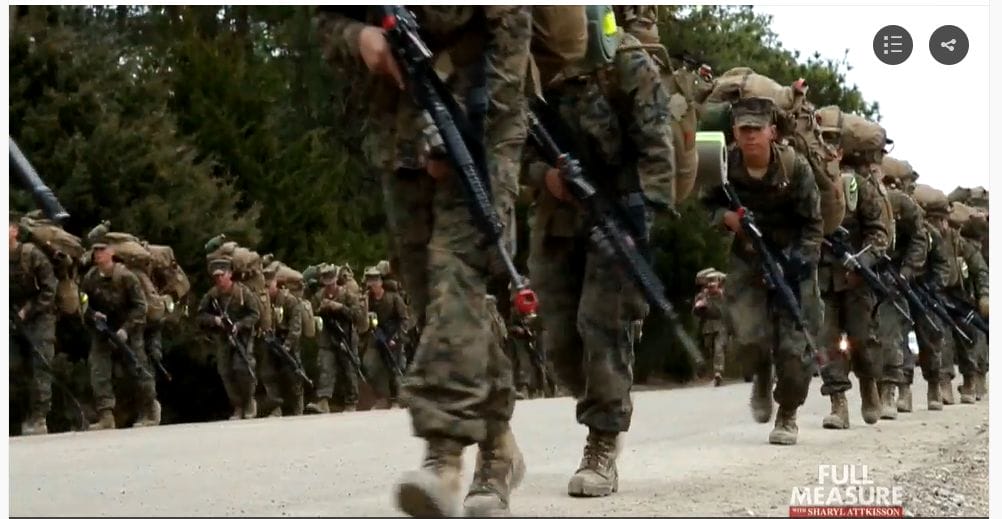Earlier this year, two former US military veterans were captured and accused of being part of a failed plot as paid mercenaries; to overturn the government of Venezuela. It did not just fail.. It failed miserably. Some professional military contractors called it a clown show. It raised a question for us: How does the world of mercenaries work, and where is the line drawn between legitimate military contractors and going Rambo? Lisa Fletcher went to find out.
‘I was helping the Venezuelans take back control.’
This is Airan Berry and Luke Denman when they became the photo-op captures by Venezuelan forces before they even landed on shore. Eight people were reported killed in a firefight between the mercenaries and Venezuelan troops.
The pair were former U.S. military special forces and working for a company called SilverCorp based in Florida, that was hired by a disjointed group composed of Venezuelans with political and military backgrounds and one common goal: to oust the sitting president.
Their failure provided a propaganda coup for their intended target: President Nicolas Maduro.
Clip: Manduro.. (in Spanish) Ans. Donald Trump.
Wait a minute, we’ve seen this movie before.
What became known as the Bay of Pigs invasion was a failed landing on the shores of Cuba, by a paramilitary force of Cuban exiles, to overthrow Communist dictator Fidel Castro, covertly financed and directed by the U.S. government.
Kennedy: Mr. Castro has said that these were mercenaries.
For most Americans, the mention of private military contractors, conjers the images of Blackwater Security Consulting. On September 16, 2007 there was a deadly clash in the capital of Baghdad. A team of former US military troops code named “Raven 23” were working for the private firm, Blackwater, which had been hired by the U.S. government, when they reportedly opened fire on innocent civilians. They claimed self-defense. The episode heightened tensions between Iraq and the U.S., and the FBI stepped in to investigate. Four of the contractors were eventually charged, one, remains in prison.
But Blackwater was just one company doing business. The United States largely contracted out its wars in Iraq and Afghanistan to private companies.
At the height of these wars, contractors made up over 50 percent of the U.S. troops in Iraq and 70 percent in Afghanistan.
Lisa Fletcher: So, we’ve got private military contractors, mercenaries, what is the preferred term?
John Tiegen: The biggest difference between hired gun, which is also a mercenary in my opinion, and a contractor or a PMC, private military contractor, would be the Venezuela incident.
John ‘Tig’ Tiegen was a military contractor. One of 6 working for the CIA in Benghazi on Sept11, 2012 when Islamic extremist terrorists attacked.
On the day we interviewed him, he was taking part in a tactical training competition, it’s a place where former military, special operations, police and current military contractors keep their skills well honed.
Can you kind of give us the 101 on private military contractors? Who are they, what they do?
John Tiegen: You’re not mercenaries, you’re just contractors, like you hire a contractor to build your pool or something like that. They’ve been using contractors since the American Revolution. George Washington was using them. So, they’ve been around forever.
Lisa: How essential are PMCs to US operations overseas?
Sam: Critical.
Sam Havelock is a former Navy SEAL commander, and now runs a website that connects private military contractors to work overseas.
Sam: So, when the special operations community or the government is saying, “Hey, we need to be more of a gray force. We need to blend in globally.” What they’re saying is they want to continue to have influence globally and project power and democracy, but do it in a way that has a lighter footprint.
Sean McFate: So, the reason why contractors are mercenaries have become so popular, even amongst nations with big and great militaries is they give you plausible deniability. And why is that important? Because we live in an information age where weapons that give you plausible deniability are more important than raw firepower.
Sean McFate is a former warrior, with the 82nd Airborne, and then became a private military contractor. Now, he’s an author and professor at the National Defense University.
Lisa: Some have suggested that military contractors, PMCs make it possible for policymakers to play both sides of the fence so they can get up to America and they can say we’ve withdrawn, we’ve pulled back, we don’t know anything about this.
Dutch: I understand that.
Chris Moyer, or Dutch as he’s better known, is a former member of the US Army’s elite Delta force and is now a military contractor.
Dutch: I guess first and foremost, I want my politicians to tell me the truth. I want that for everybody. But two, I guess I want my policymakers also to have an out. Now, it doesn’t mean we’re lying. It doesn’t mean we’re covering up. But if indeed the public speaks and says we want all military assets out of X country, okay. And then those are out. But can we have some military experienced contractors on board to help continue to train, equip, help this country that is friendly to us. I personally don’t see anything wrong with that.
Sean McFate: Contracting is one of the biggest insecurity trends of the 21st century that nobody’s paying attention to. I mean, anybody who wants to rent military force can and can wage war for any reason they want,
Billionaire Ross Perot backed a rescue mission in Iran in 1979 to extract two of his employees being held in Iran, that became more Perot fable than fact. The novel and the miniseries were a well fictionalized version of what happened on the ground.
Lisa: I mean, can anybody with that much money rent soldiers and become a superpower, essentially?
John Tiegen: I think a lot of the very, very wealthy have gotten away with a lot of stuff, and there’s a lot of arrogance, all the way from the Rockefellers to now.
And money, is part of the problem and solution. Nearly 200,000 veterans leave the service every year. For the small percentage with special forces training, that unique skill set built on years of training and paid for by the American taxpayer, transition to civilian life, when your whole life has been that of an alpha warrior.
Lisa: What’s the best part of it?
Dutch: When I got out in 2013, somewhere in there in 2012 or 2013, I thought I was finished with this life. But as soon as I was out, I started missing it. I also miss the challenge of working with whether it’s my own people or indigenous forces in support of war policies that help us win whatever fight we’re trying to win. I do. I do. I missed it. So, I had to go back, and I’m not going to quit anytime soon.
Sharyl (on camera): The Pentagon spent $160 billion taxpayer dollars on private military contractors between 2007-2012. That’s four times the entire defense budget of the United Kingdom. And that may only be part of it since more may be spent from black budgets that are kept secret.
https://fullmeasure.news/news/terrorism-security/american-mercenaries




Sharyl,
Re: The Combatants
From the logic- and history-steeped mind of Helena :
“ It is Sunday and the ‘Council For Inclusive Capitalism’ is making headlines as Pope Francis joins The Movement. Timing is everything. It appears as though the shadows are moving into the light. Emerging into mainstream as they seek to enforce the final Act of their Shakespearean Play for global dominance, these organizations are anything but ‘inclusive’. They are the money hoarders who built their fortunes on chaos, poverty and death. And they call themselves: The Guardians. “
-Rick
R u saying they are against Americans and President Trump because the Vatican was with hitler
Being a regular watcher of Full Measure, I was pleased to see yesterday’s treatment of mercenaries as a tool of US policy. So much for the Third Amendment. Mercenaries and the Shadow Government are a big part of the abdication of constitutional governance by our elected representatives, enabled by “black budgets” and other invisible money.
I have always understood such actions violated more than one US law. While the US Constitution authorized letters of marque, I don’t recall the last time such a letter was issued though it has been discussed within the last 20 years by Congress.
But a private citizen waging war as a mercenary is almost certainly against US law. But that rests on the claim that the US can claim and exercise legal jurisdiction outside the US. That ought to be a dubious claim but it often works as smaller nations can’t ignore the 800 pound gorilla in this arena.
This is a very enlightening piece. I had previously assumed a far smaller role for military contractors and have never considered the concept of “plausible deniability”. But it fills in a lot of gaps in my thoughts about how it is that the US facilitates destabilization in various countries. I would love to hear some of these contractors’ description of the seeming chaos that took place in Syria before Russia brought that episode to a close.
Fact is, there is a lot of heavy lifting by Contractors within DoD. In a nutshell, it takes more to run DoD than the government is willing to hire as GS employees, or increased troop levels. So, some work is asked of contractors. Whether assembling toilets in a war zone, Pulling private security details, moving pallets of -you name it; or, providing intellectual-human capitol. Analytical work within DoD is often supported by Contractors. Within the Special Operations Community, Contractors play an important training role, as well as intellectual capitol for various projects. To the government, they pay up front without having to worry about bennefits, and they can extend or cut ties whenever they want depending on the product produced or service provided. P.S. Good to see good journalism from the few remaining these days.